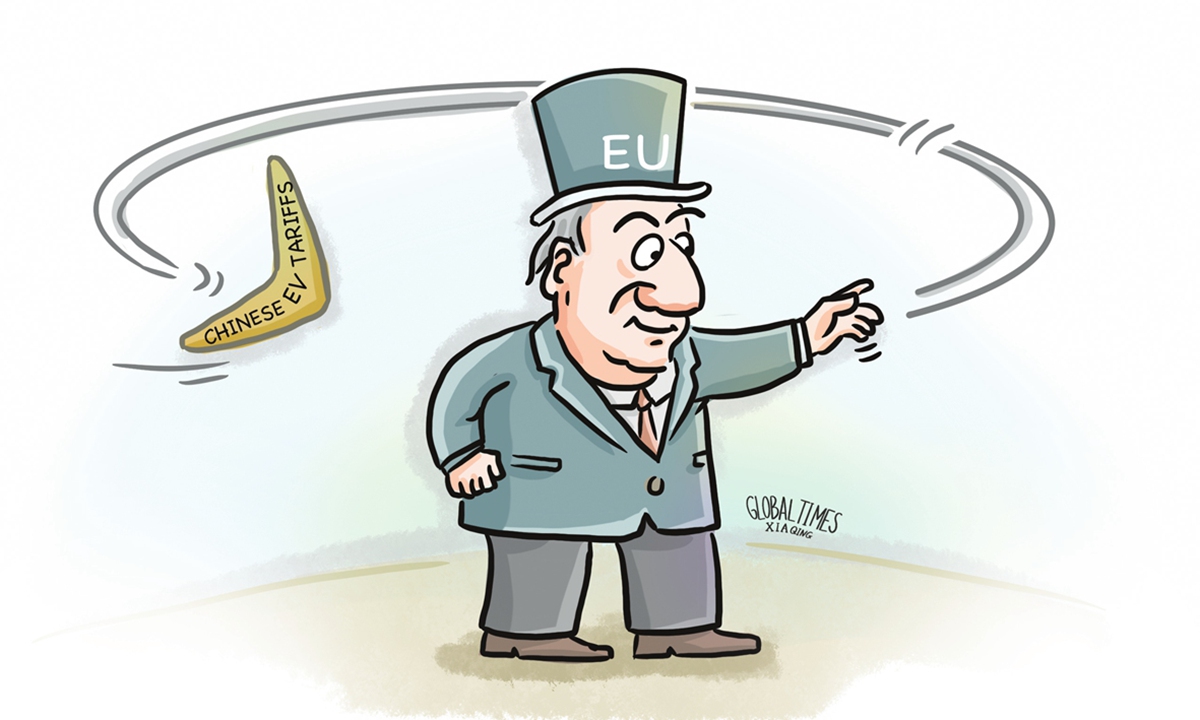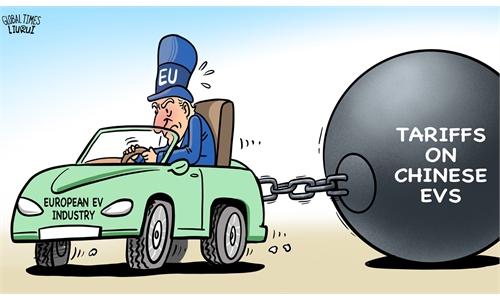Sneaky tactics under negotiation table not a wise approach by European Commission: Global Times editorial

Illustration: Xia Qing/GT
The China Chamber of Commerce for Import and Export of Machinery and Electric Products (CCCME) issued a statement on Wednesday evening, revealing that during negotiations with the EU regarding the electric vehicle (EV) anti-subsidy investigation, the European Commission had negotiated price commitments with some Chinese automakers separately, while negotiating with the Chinese authority. The CCCME firmly opposes this, arguing that such a move would shake the foundation of the negotiations and mutual trust, and disrupt negotiations between the two sides. We believe this detail is far from trivial, as it concerns not only the credibility of the European side and its respect for basic negotiation rules, but also the direction of this important negotiation. Therefore, the European side cannot pretend to be deaf and ignore the Chinese side's opposition.
The significance of this negotiation is evident, as it not only pertains to the outcome of the so-called anti-subsidy investigation but is also likely to mark the beginning of a process where China and Europe utilize innovative rules to address trade issues amid a wave of industrial upgrading and transformation. Thus, both sides attach great importance to it. Over the past 20 days since September 20, technical teams from China and Europe have engaged in eight rounds of intensive consultations in Brussels. After strenuous efforts, important progress has been made. According to a source, the talks lasted about 50 hours, with the Chinese team working through the Mid-Autumn Festival and National Day holidays, submitting over 27,500 pages of materials in response to technical questions raised by the EU. In the consultations, the Chinese side fully listened to the demands and opinions of the China-Europe business community, repeatedly proposed practical and constructive solutions, and demonstrated the utmost sincerity and flexibility.
However, it is regrettable that significant differences still exist between both parties, preventing them from reaching an acceptable solution. The fundamental reason lies in the European side's lack of a sincere negotiating attitude, characterized by inconsistency between words and actions. They even carried out tactics like "dual negotiations." The latest detail disclosed by the CCCME serves as a typical example. 12 automotive companies, including European-invested enterprises in China, have authorized the CCCME to propose a price commitment plan that represents the overall position of the industry, which is the foundation of China-Europe negotiations. However, the European Commission promoted "individual discussions," in an attempt to undermine and divide the Chinese side's demands through one-on-one negotiations, as well as to gain an unfair competitive advantage. This practice exposes the European side's opportunistic mentality. Such "petty tricks" are neither dignified nor wise and will ultimately prove ineffective.
Although the EU's tariffs on Chinese EVs will take effect in late October, the EU has indicated through various channels that negotiations may continue for a longer period. European Commission President Ursula von der Leyen recently stated that negotiations with China would continue even if the EU's tariffs on Chinese EVs entered into force. This attitude reflects the EU's clear understanding that imposing tariffs on Chinese EVs would harm the Europe's interests. The tariff increase strategy will inevitably backfire. German Chancellor Olaf Scholz previously pointed out, "Negotiations with China on electric vehicles must continue… We as the EU must not harm ourselves in trade conflicts." Therefore, continuing negotiations is not a form of "leniency" from the EU toward China; both sides are on equal negotiating ground, and the EU needs to have a clear understanding of this.
In fact, whether viewed from an industrial perspective or from the standpoint of market development, it is clear that resolving differences between China and Europe in a proper manner is beneficial to the interests of all parties involved. Even before the investigation began, attempts to manipulate tariffs to protect domestic industries failed to receive unanimous support within the EU. After the EU voted to adopt definitive tariffs on China-made EVs, the opposing voices have become clearer. Scholz revealed that 17 other states were skeptical of this policy. It is entirely foreseeable that trade protectionism will not progress far and will not yield good results.
Both China and Europe hope for a successful negotiation; however, one of the keys to success lies in whether both parties can trust each other's sincerity and commitment. The European side needs to set aside short-term interests and promote deep cooperation between both sides from a long-term perspective in this era of globalization. The global EV industry is not a zero-sum game; there is significant space and potential for future market development, and cooperation is the only way to resolve the subsidy issues in the EV industry between China and the EU. It is hoped that the European side will recognize and respect China's sincerity and wholeheartedly return to the correct path of equal negotiations; otherwise, it will only lead to an escalation of trade frictions, affecting the stability and sustainability of the global supply chain.
China and the EU, as two major economies in the world, have the responsibility to resolve differences through cooperation rather than creating confrontation. China has formally invited the EU technical team to visit as soon as possible to carry on the next phase of face-to-face consultations, and has made all necessary preparations for this. The Chinese side has demonstrated its utmost sincerity in resolving differences through dialogue and consultation; meanwhile, the Chinese side's de-termination to safeguard the legitimate rights and interests of Chinese enterprises will never change. These are two realities that the European side must recognize.

